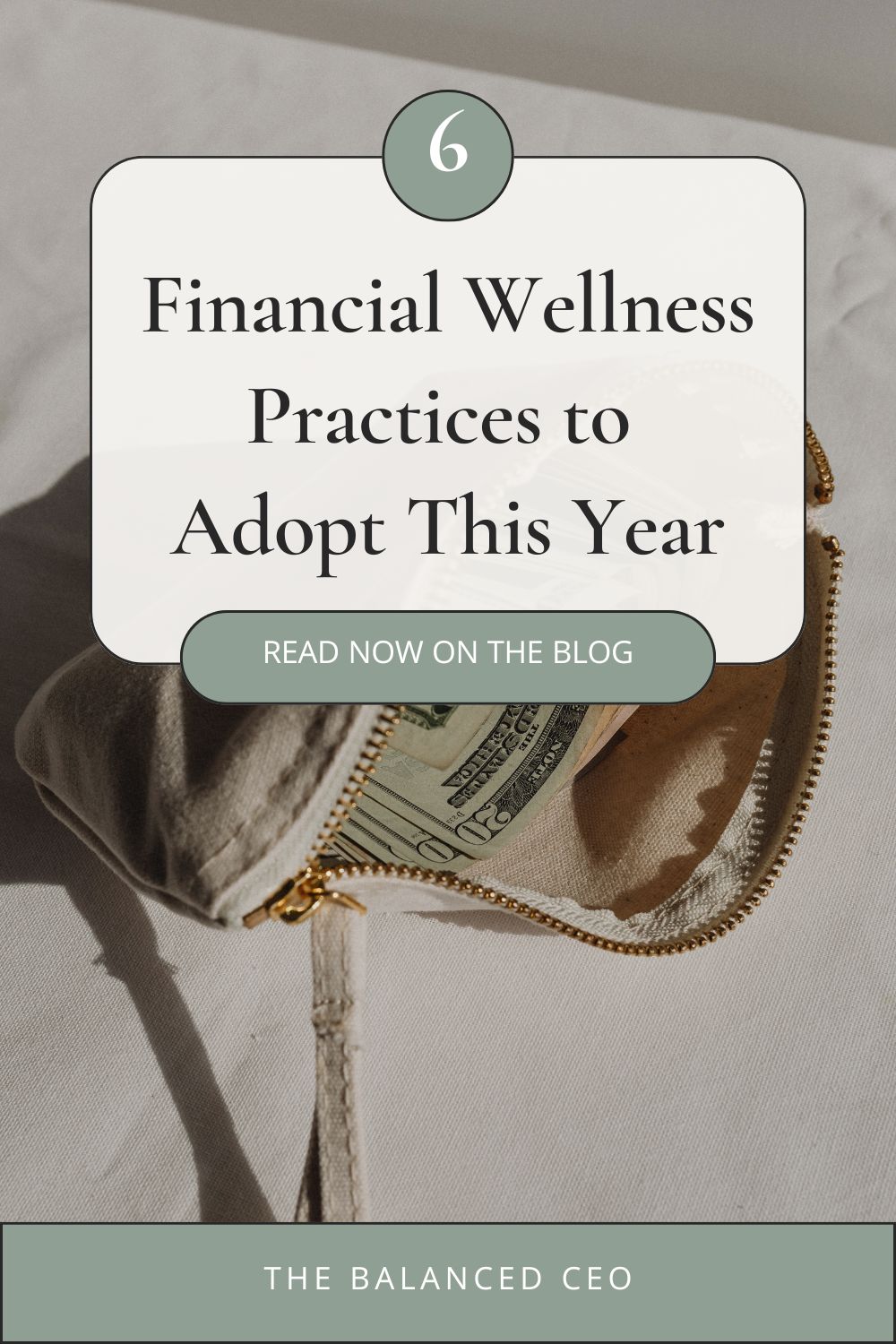This post may contain affiliate links, which means I’ll receive a commission if you purchase through my links, at no extra cost to you. Please read full disclosure for more information.

Wellness is often associated with physical and mental health. In recent years, the concept of financial wellness has emerged. Just as physical fitness involves working out and eating a balanced diet, this concept entails healthy practices to help you feel confident in managing money. Discover financial wellness practices to employ this year so you’ll feel more secure and confident well into the future.
What Is Financial Wellness?
Financial wellness is a state in which you lead a healthy fiscal life. It’s not just about how much money you make but how you manage and spend it. These four elements of financial wellness summarize the goals:
- Security today: Having control over your daily finances
- Security in the future: Being comfortable handling financial emergencies
- Freedom of choice today: Having financial freedom to spend money to enjoy life
- Freedom of choice in the future: Staying on track to meet your long-term financial goals
6 Practices to Achieve Financial Wellness
Financial wellness requires time, effort and practice to achieve. Here are some steps to help you feel more secure about your monetary situation and improve your future outlook.
1. Set Meaningful Financial Goals
Setting goals is the first step to financial success. You can’t track your progress without them. Form SMART goals that are specific, measurable, achievable, relevant, and time-bound, which will help you progress slowly but surely.
Some examples include:
- Paying off $10,000 of debt in 5 months
- Increasing income by $20,000 this year
- Spending less than $50 on fast food weekly
- Saving $500 for retirement every month for a year
Your goals should be scalable. Life throws curveballs, and you should be ready to adjust as needed. Tweak your target savings if you get a raise. Move your goal to next month if you have an emergency expense. Regular check-ins on your financial targets will help manage your expectations.
2. Create a Budget
Around one in four parents in the U.S. say they have struggled with food and house expenses. Creating a budget is one way to assess where your money is going. Without knowing this essential information, you might be spending more than you make monthly, causing financial distress.
There are various methods you can use to approach your monthly budget. Find one that you feel comfortable with and ensure you stick to it.
- 50/20/30: 50% of your income should be spent on needs, 20% should be saved and 30% should go to wants.
- Pay yourself first: This method urges you to transfer a predetermined amount into your savings account before spending for your needs and wants.
- Zero-based budget: All your money must go to a specific expense — including savings — in this budgeting method.
- Envelope budget: Cash out money and put specific amounts in envelopes for specific purposes. You can also manage your funds using a spreadsheet or app.
3. Prioritize Debt Management
Managing and avoiding debt should be a priority starting this year. Every dollar you pay in interest is money better spent on investments. Plus, the freedom from having debts can finally help you build wealth.
Set up a realistic repayment plan. It might be the debt snowball method, where you start paying smaller debts for quick wins, or the avalanche approach, in which you first pay debts with the highest interest rate.
4. Pay Off Credit Cards in Full
Paying off your credit card debt in full each month is an excellent way to save money and build credit. Although 96% of Americans pay bills on time, some still have late fees. Carrying a balance costs money because interest and charges pile up, which may lead to a credit card debt trap.
Your credit card is a valuable tool that can be powerful when used responsibly. If you can’t pay off in full, at least have a solid strategy to repay it. At the very least, ensure you pay more than the minimum amount and avoid using your card if you’re putting more on it than taking off each month.
5. Cook Meals at Home
Technology has made it easier for people to order fast food anytime, anywhere. A $12 meal daily might not cost much, but if you add them up, your spending could reach thousands yearly. Cooking meals can be challenging, especially if you live a busy lifestyle, but it can do wonders for your financial wellness.
Reduce your takeout meals and increase the frequency of home-cooked breakfasts, lunches, and dinners. You’ll be surprised to see how much you can save after a month and will likely feel much healthier, too.
6. Invest in Yourself
Acquire new skills and knowledge to make yourself more valuable in the marketplace. Education is an investment — the things you learn through online courses or at school can never be taken away from you. Attaining certifications and attending training sessions could open up new, high-paying opportunities, making it easier and faster for you to achieve your financial goals.
7. Claim compensation you’re entitled to
Following a disaster, a lot of us fail to look into compensation that we may be entitled to. Seeking legal compensation with the help of a lawyer is often possible following loss of income that is the result of someone else’s negligence. For example, if you were injured because someone collided into your car or spilled hot coffee on you, it may be possible to make a personal injury claim.
This is not the only compensation that you may be entitled to. There are instances where you may be eligible for government financial assistance, state grants or charity support. An example is natural disasters – if your home is destroyed by a flood or fire, you should consider whether there are charities or local grants that can help provide funding to recover. You are not as alone as you think you are.
4 Signs You’re Financially Healthy
Once you get a handle on your finances, you’ll feel more in control of your life. Some measures can help you evaluate whether your financial wellness practices are working for you.
1. You Spend Less Than Your Income
This is a basic principle, but it can be hard to stick to. You’re financially healthy if you’ve finally learned to spend less than you earn and put the remainder in your savings account.
2. You Have Insurance
Health, home, car and life insurance are your safety nets against emergencies. Investing in these forms of protection helps you stay financially stable despite an urgent situation. You could’ve even used a health insurance broker to find the best insurance for your needs.
3. You Have a Good Credit Score
Your credit score represents how trustworthy you are. It’s based on how timely you pay your bills and loans.
4. Your Financial Stress Levels Are Low
Financial stability could improve your overall happiness, leading to wiser life decisions. You might be financially well if you don’t constantly worry about whether you have enough money for bills because you already practice healthy habits.
Take Control of Your Finances Today
Achieving financial wellness is a journey that requires discipline and a proactive approach. Implementing these tips can motivate you to take strides toward economic independence, regardless of age, status, and career. Remember that it’s never too late to start and achieve your goals.

Cora Gold
Contributor





Leave a Reply